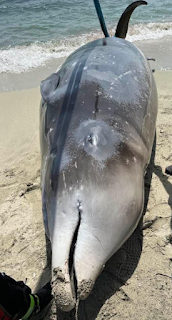2024, May 18. Corsica,
Aleria, Serra di Fiumortu and Ghisonaccia, Mediterranean Sea. Three
Cuvier's Beaked Whales strand with two dying. The individual at Ghisonaccia
was 6 meters long and weighed 1.8 tons.
2024
- Three whales wash up on three separate beaches in Corsica, two are
dead (actualnewsmagazine.com)
2024, May 14. Italy,
Abruzzo, Campania, Emilia-Romagna, Lazio, Marche and Steiermark.
Fireball. Time: 0:06 UT. 2024-05-14 22:06CEST.
.png)
2024, May 19. Time 0:46
CET (23:46 Lisbon time). A bright fireball crossed the skies of Spain
and Portugal and as far away as France. Meteor (likely a fragment from a comet). It was travelling NW. delivering concurrent and delayed sound. Time: Lisbon time: 23:46 or
0:46 CET. The AMS has the following date/time: 2024-05-18 22:50 UT;
2024-05-19 00:18. Due to this event's atmospheric bruising, a marine animal disturbance alert should be considered for the next 14 to 30 days. Any animals located after 14 days will die quickly or wash ashore already deceased. Affected areas include the coastal waters of Portugal, Spain's northern and southern coastlines, France's southern coast, United Kingdom, Ireland and the Azores. Because of its location past the continental shelf, the risk to Cachalots (sperm whales) is highly likely. The meteor is said to have come in at 40.4km/s, travelled 500km in ten seconds and dismantled at an altitude of 60km over the Atlantic Ocean.



.png)
.png)


.png)
